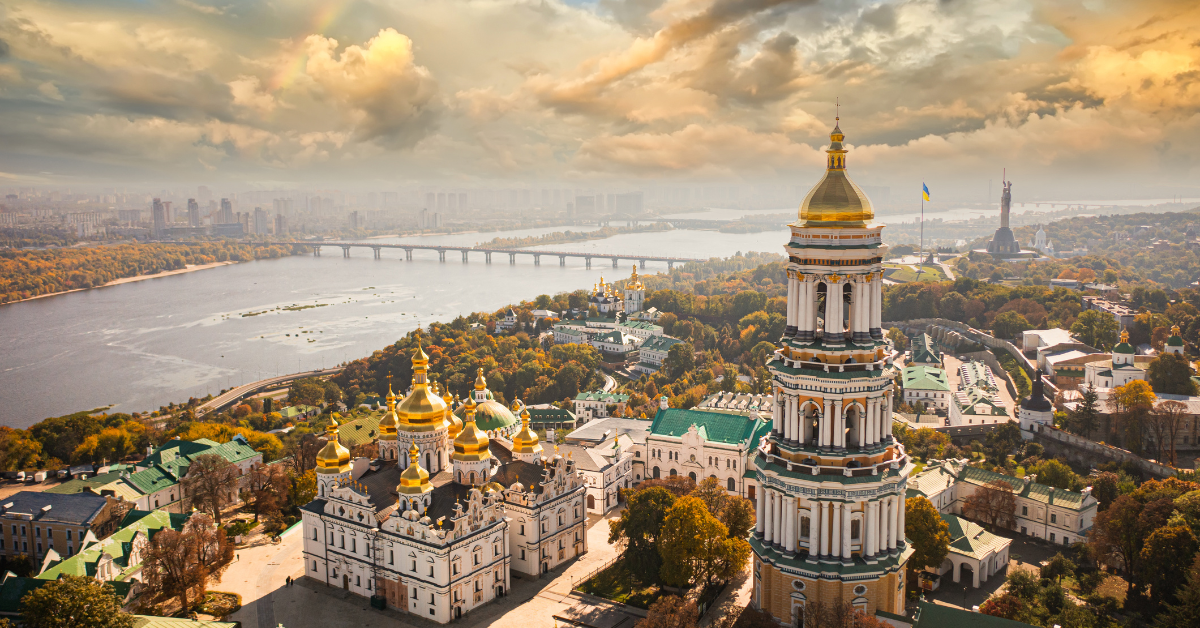The Ukrainian capital Kyiv has no Kanji representation.Formerly known as “Kiev,” this change reflects Japan’s recognition of Ukraine’s linguistic and political sovereignty.
More than a linguistic update, it represents a global message of cultural respect and solidarity.
Why Kyiv Has No Kanji Name
The name “Kyiv” is written in Katakana because it transcribes the Ukrainian pronunciation “Kyiv” (キイウ) into Japanese phonetics. The former name “Kiev” came from the Russian pronunciation “Kiyev,” a remnant of the Soviet era.
After Ukraine’s independence, linguistic reforms promoted Ukrainian spellings, and “Kyiv” became the international standard. In 2022, the Japanese government officially adopted the new transliteration, updating all diplomatic and media use accordingly.
| City | Old Form (Russian) | New Form (Ukrainian) | Year Adopted |
|---|---|---|---|
| Kyiv | Kiev | Kyiv | 2022 |
| Kharkiv | Kharkov | Kharkiv | 2022 |
| Odesa | Odessa | Odesa | 2022 |
Thus, major cities in Ukraine are now represented based on Ukrainian pronunciation, reflecting the country’s independence and national pride.
The Meaning Behind the Name Change
The shift to “Kyiv” conveys a strong political message of linguistic and cultural independence. Language is a cornerstone of national identity, and choosing which one to use reflects a country’s stance in global diplomacy.
The UN, EU, and G7 nations have all adopted “Kyiv.” Japan followed suit, aligning itself with the international community and expressing respect for Ukrainian sovereignty.
This change is not just about phonetics—it is a symbolic act affirming recognition of Ukraine’s sovereignty.
| Aspect | Kiev (Old Name) | Kyiv (New Name) |
|---|---|---|
| Language Origin | Russian | Ukrainian |
| Historical Context | Soviet legacy | Symbol of independence |
| Emotional Impression | Part of Russian culture | Symbol of freedom and pride |
| Global Recognition | Outdated term | Politically accurate and modern |
How Japanese People Perceive Kyiv
For many years, “Kiev” carried a Russian cultural connotation, while “Kyiv” now evokes Ukrainian pride and resilience.
Historically known as the “Mother of Eastern Europe,” Kyiv has been a hub of religion, music, and architecture for centuries. The city’s golden-domed churches, grand monasteries, and scenic boulevards make it one of Europe’s most beautiful capitals.
| Category | Image of Kiev | Image of Kyiv |
|---|---|---|
| Sound | Traditional, Russian | Modern, independent |
| Cultural Image | Extension of Russian heritage | Center of Ukrainian identity |
| Japanese Perception | Historical, distant | Contemporary, symbolic of solidarity |
For Japanese people, Kyiv is shifting from a “war-torn place” to a “symbol of peace and dignity.”
How Sports Changed Kyiv’s Image
Sports play a powerful role in shaping a nation’s image. Kyiv, as Ukraine’s capital, has long drawn attention through football.
The famous club Dynamo Kyiv is one of Europe’s legendary teams, having produced numerous star players since the Soviet era. Among them, Andriy Shevchenko became a national hero and remains widely known in Japan.
Despite the recent war, Dynamo Kyiv players continue to participate in charity matches and peace initiatives, representing the endurance and unity of their country. Around the world, football fans associate Kyiv with hope and resilience.
| Era | Key Event | Significance |
|---|---|---|
| 1980s | Dynamo Kyiv dominates in Europe | Golden age of Ukrainian football |
| 2004 | Shevchenko wins Ballon d’Or | Birth of a national icon |
| 2022 | Charity matches for peace | Symbol of unity and strength |
Sports have given new meaning to the word “Kyiv,” transforming it into a global emblem of courage and hope.
Understanding the Difference Between Ukrainian and Russian
To grasp the deeper meaning of “Kyiv,” one must understand the differences between Ukrainian and Russian. While both belong to the Slavic language family, their pronunciation, vocabulary, and grammar differ significantly.
| Comparison | Ukrainian | Russian |
|---|---|---|
| Capital Pronunciation | Kyiv (キーウ) | Kiev (キイェフ) |
| Alphabet | Cyrillic (Ukrainian form) | Cyrillic (Russian form) |
| Linguistic Origin | Old East Slavic + unique development | Old East Slavic + Church Slavonic |
| Cultural Meaning | Symbol of independence and pride | Reminder of past dominance |
As this table shows, “Kyiv” stands as a linguistic declaration of cultural independence.
Japanese Writing and Readability
In Japanese, foreign words are expressed in Katakana, and “キーウ” follows this rule.
However, effective writing requires balancing grammatical accuracy with natural rhythm. The arrangement of phrases and punctuation affects readability, so even foreign names should be written with clarity and flow. This reflects the Japanese writing principle of conveying meaning smoothly and precisely.
Sports and Culture as Forces of Global Solidarity
During international competitions such as the Olympics and World Cup, Ukrainian athletes often display messages of peace. Seeing Kyiv-born athletes enter the arena carrying their national flag has deeply moved many Japanese viewers.
In Japan, charity matches and fundraising events have further strengthened emotional ties with Ukraine.
Kyiv’s presence also extends beyond sports. In ballet, classical music, and art, Kyiv-born artists are earning international recognition. Together, sports and culture present a unified message of peace and perseverance.
Through this union of expression, Kyiv has become a symbol of international solidarity and hope.
Conclusion
Kyiv has no Kanji name, and its Katakana transliteration reflects both linguistic accuracy and respect for Ukraine’s sovereignty.
The name change is not merely phonetic but a declaration of cultural independence.
Among Japanese people, the perception of Kyiv continues to evolve—from a city associated with conflict to one representing peace, unity, and resilience.
Thanks to sports, art, and cultural exchange, Kyiv now stands as a city of hope and strength rather than a symbol of war.
Language is culture, and culture is the foundation of peace.
The name “Kyiv” carries with it a message of dignity, perseverance, and faith in the future.






